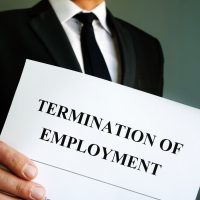What Is Wrongful Termination?

Employment relationships are generally “at-will” in California, meaning either the employer or the employee can terminate the relationship at any time for any reason, or no reason at all. However, there are significant exceptions to this rule that protect employees from being unfairly or unlawfully terminated. Below we talk about what it means to be wrongfully terminated or wrongfully discharged in California and what you can do about it if it happens to you. For specific advice related to your particular situation, contact Ochoa & Calderón to speak with a skilled and knowledgeable Riverside labor and employment law attorney.
Wrongful Termination Under California Employment Law
Wrongful termination refers to the dismissal of an employee in violation of state or federal laws or in breach of an employment contract. In California, employees may have a valid claim for wrongful termination if they were fired due to:
- Discrimination based on race, color, gender, age, ancestry, religion, creed, disability, sexual orientation, denial of family and medical care leave, marital status or medical condition.
- Retaliation for reporting unsafe working conditions, harassment, or other illegal activities.
- Breach of an express or implied employment contract.
These reasons for wrongful termination are described more fully below.
Discrimination and Wrongful Termination
The California Fair Employment and Housing Act (FEHA) makes it illegal for an employer to terminate an employee on the grounds of discrimination. This covers discrimination based on various characteristics like race, gender, age, disability, and more. For instance, if you have been fired and believe that the termination was motivated by such discriminatory factors, you may have a claim for wrongful termination.
Retaliation: A Leading Cause of Wrongful Termination
Employers in California are also prohibited from terminating an employee in retaliation for engaging in legally protected activities. This includes reporting harassment, discrimination, or workplace safety violations, or taking time off work for a protected reason, such as to perform jury service. An employer cannot legally fire an employee for filing a complaint with regulatory agencies such as OSHA or the California Department of Fair Employment and Housing (DFEH), or for filing a workers’ compensation claim. Participating in workplace investigations is another protected activity.
Breach of Contract: Express and Implied Contracts
California law recognizes both express and implied employment contracts, even if they are not written. An express contract is generally straightforward—written terms agreed upon by both parties. An implied contract is based on the behavior and communication between the employer and the employee over time. A contractual employee is no longer at-will, and they generally cannot be terminated except in conformity with the contract. For instance, the contract might set out a timeframe for the employment relationship, list reasons for dismissal, or contain a provision that termination can only be “for cause.”
If you were terminated in a way that violates the terms of an express or implied employment contract, it could be deemed a wrongful termination. It’s essential to consult with an experienced employment attorney to evaluate your specific circumstances.
What To Do If You’re a Victim of Wrongful Termination
If you believe you’ve been wrongfully terminated, the first step is to consult with an experienced employment law firm like Ochoa & Calderón. We can help you:
- Document evidence: Gather emails, messages, performance reviews, and any other relevant documents.
- File a complaint: We will guide you through filing a complaint with the relevant state or federal agencies.
- Legal representation: If it comes to litigation, having competent legal representation can make all the difference.
Get Professional Legal Help to Fight Wrongful Termination
Understanding wrongful termination is crucial for both employees and employers in California. The state provides numerous protections against unjust employment termination practices. If you suspect you’ve been wrongfully terminated, seeking professional advice can be an invaluable step in asserting your rights and receiving fair compensation. Contact Ochoa & Calderon for a consultation to discuss the specifics of your case and explore your options for legal recourse. Call 951-901-4444 in Riverside or 844-401-0750 for help throughout Southern California.
